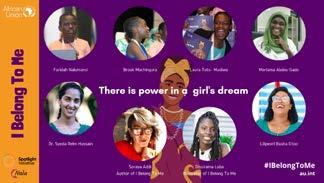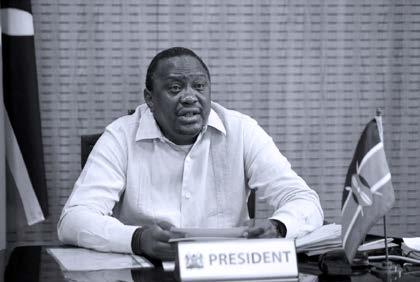
12 minute read
Celebrating Every Achievement
Champions H.E. President Kenyatta Champions actions To End FGM
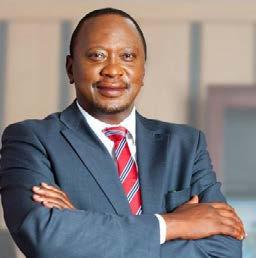
Advertisement
“ I would like to restate my commitment and that of the Government of Kenya to provide the leadership necessary to ensure that FGM ends within this generation”.
-President Uhuru Kenyatta
PREsIDENT UHURU KENYATTA, KENYA’s PREsIDENT HAs oN MANY oCCAsIoNs sTATED HIs CoMMITMENT To PUTTING AN END To FGM. As A CHAMPIoN, HE HAs PAssED sEVERAl lAWs IN FAVoUR oF WoMEN AND HAs Also ENCoURAGED AND sUPPoRTED loCAl INITIATIVEs oN THEsE sUbJECTs.
On the 4th of June, 2019, His Excellency (H.E) President Uhuru Kenyatta made a firm commitment to put an end to FGM by the year 2022 at The Women Deliver Conference in Vancouver, Canada. This was the world’s largest conference on gender equality that brought together government officials, human rights activists, academics, media and advocacy organisations from around the world with at least 8,000 participants.
The enactment of the Prohibition of FGM Act, 2011 was a key milestone in the campaign to end FGM in the country. Despite the legislative and policy measures put in place to prohibit the practice, it still persists in certain communities. At the Nairobi summit held in November 2019, an International Conference on Population and Development (ICPD) +25, Kenyatta addresses Kenya’s role in eliminating FGM:
“I commit to providing the leadership necessary to ensure that FGM ends within this generation” he went ahead to add that, “in addition, the country will eliminate all forms of GbV and harmful practises by 2030 through the strengthening of co-ordination mechanisms and by addressing cultural norms that propagate these practices”.
The President has reaffirmed his commitment on many occasions at the High-level Elders Forum at state House. He is also known to have convened cultural and religious leaders from communities with high rates of FGM, whereby he encouraged them to end the practice. Commitments to support the President’s vision have been signed and supported by many local leaders so far. The President works very closely with the relevant government agencies to ensure that the law is enforced and that action is taken against all perpetrators. such inputs from decision-making positions add more to the actions against FGM.
a Celebration of the african History and Heritage
A FoCUs oN GIRls’ AND WoMEN’s RIGHTs
Soraya Addi is the Author of I Belong To Me, a book about a celebration of African history and the heritage of girls and women’s rights and the path towards the elimination of harmful practices, such as FGM and child marriage. Addi is an advocate for women’s and girls’ rights and advocates for an African Union, the UN and is a Spotlight Initiative steering committee member
1. What prompted you to advocate for women’s rights ?
The first and most obvious reason I advocate for women’s rights is the fact that I am a woman. In a world in which our rights are under attack every day, wherever we are, we need to stand up for our choices and lives however we can, and I was lucky enough to make a career out of it.
The second reason is because I am a survivor of sexual violence. I was 8 years old the first time I was sexually assaulted and by the time I was 10, I had been sexually abused severally by 3 different men. I grew up keeping it a secret because I had internalised the rule of victim shaming. I was convinced that it was my fault, simply because I am a female and that there was something diabolical in me, reasons I never spoke about it. I felt so lonely and hopeless, and I blamed myself. In my early 20s, I started talking about this GbV I had gone through to my female college friends and realised with astonishment that literally every woman I met had a sexual violence story. Each single one of them.
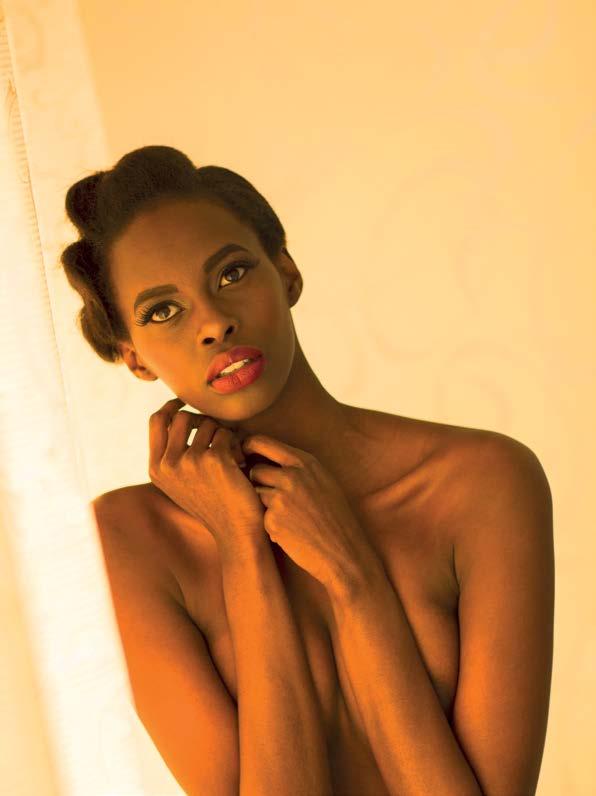
The feeling of shame transformed into a rage, and after many years and efforts, I found a way to channel that rage into positive action. The most effective way I have found has been to give platforms for meaningful participation to the ones we call “voiceless” and to make sure our manner of viewing survivors is always dignified. The saleema Youth Victorious Ambassadors programme was born from these objectives.
It still requires the mobilisation of an incredible amount of energy to fight the sexist narrative I have internalised that we all grew up with, coupled with the frustration of seeing that social norms are not changing fast enough and millions of girls’ and women’s most basic human rights are still being violated. I can still see in myself the many aspects in which my trauma expresses itself, which affects my behaviour and hinders part of my abilities. However, entering the international system and working with women as well as under women’s leadership has played a huge role in my healing process and has allowed me
I am a survivor and I kept silent. This is my first time of speaking publicly about it.
to understand how deeply gender biased I was as a survivor and I kept silent. Violence affects not only survivors but also societies in
2. How can you rate the impact of what you do and how can we maximise this?
The activities to empower women has been organised within the context of the African Union’s initiative on the elimination of FGM, the ‘saleema Initiative’. The African Union is a highlevel political organisation and its impact on women empowerment has been measured in two levels: the capacity to mobilise high-level stakeholders to participate in the empowerment platforms and the capacity to open the platform to other beneficiaries, activists and survivors to make sure that the door we have opened remains unlocked to amplify more voices. This is still a work in progress, and even though we did open the platform to civil society actors we still have room for improvement.
3. What advice do you have for young girls and women who are silent about violations?
Girls and women have the right to stay silent, just as much as they have the right to speak up. Girls and women have the right to feel strength and vulnerability, to be bold and to need protection. There is no right or wrong behaviour. The patriarchal system is a very complex and multi-
It is through collective actions, that women can take actions against all forms of GBV that they face
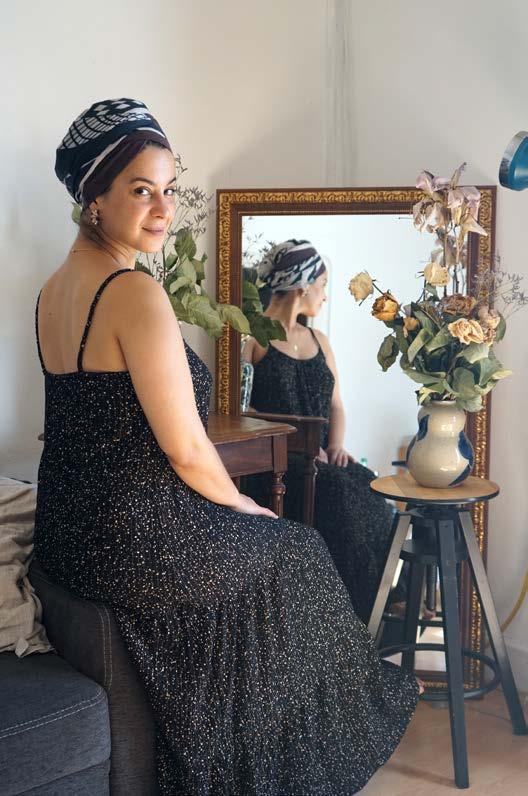
layered system of oppression that exists in every part of the world with different symptoms, sometimes contradictory looking symptoms and having the empowerment to break the silence is a long and painful process that also requires a certain level and form of privilege.
I am a survivor and I kept silent. As I said, this is my first time of that speaking out publicly about this. The perpetrators of the assaults against me are free. I have made this choice for now, and maybe I will make a different choice later, or I will stick with this choice. Whichever the case may be, I am creating the capacity for me to make a choice. In the meantime, I have decided to channel my energy and dedicate my time to working on building platforms for women who have decided to speak up, and I am devoted to creating legal means to end GbV. My advice to girls and women is to deconstruct the sexist narrative, which we have all internalised, and reconstruct their view of themselves and of the world with kindness, dignity and worthiness. They should always focus on themselves first, their potential and their needs. If that leads to them speaking up, keeping silent, seeking justice, creating or joining support groups, or taking action at grass-roots or political levels. It is all valid, as long as it is their own choice and that they place themselves at the
4. In your opinion, how can women collectively take actions against all forms of violations against women?
I think the answer is in the question. It is through collective action that women can eliminate all forms of GbV they face. This could be done through sisterhood, structures and holistic and intersectional approaches. We need to open channels of communication among ourselves and strengthen the existing networks of women working on girls’ and women’s rights.
Furthermore, we need to invest in the decision-making tables at local, national, regional and international levels. We must be represented in all spaces that affect any aspect of girls’ and women’s lives.
Moreover, we also need to create collective tools for the younger generations to know their rights and worth, and involve small and big stakeholders. This for instance is our reason for creating the ‘I belong to Me book’, which tells the story of the rights of African girls and women. It is the first book produced by the African Union Commission, and it was designed with the support of the spotlight Initiative Africa Regional Programme and the Nala Feminist collective by bringing together African females who are experts in different fields such as child development, decolonisation, intersectional feminism etc.
Ending GbV is not only about decreasing the numbers through legal and programmatic mechanisms, but also empowering the next generations to scale up their actions, to build on the lessons learned and the achievements which have been attained so far, and I am certain that GbV will end, as there is no other viable option.
Voicing Their Voices
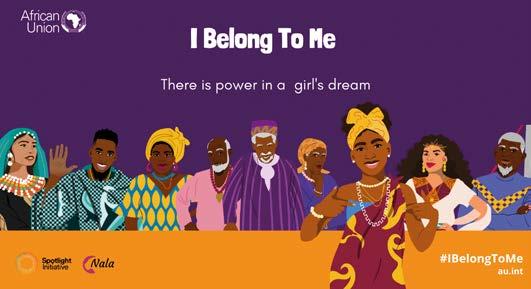
“Ibelong To Me” is a celebration of the African History and Heritage on Girls’ and Women’s Rights and the path towards the elimination of Harmful Practices, FGM and Child Marriage.
The main character, an 11-year-old girl called saleema, travels the Continent to visit the cities where the main African policies related to Girls and Women’s rights were adopted in order to discover that there is legitimacy and power in her voice and in her dreams.
The book is an ode to African Culture and History through an authentic narrative that unveils the power of African storytelling, intergenerational dialogue and collaboration.
We honour the ancestors and empower the youth to always aim higher and further, because we know what was, what is and what can be.
aBiMBola alaDEjarE-SalaKo
organising the High level Accountability framework in commemoration of the 2021 Zero Tolerance Day to end FGM, leading young people at the global youth round table organized by the UNJP in Dakar to develop youth work-plan for the next phase of the Joint Programme, organising a laudable side event at the African Girls summit 2021, among other notable events where I have been opportune to represent the African Union and the voice of survivors at global High level events have been very empowering.
Its been a platform to network, learn and share for me. And I look forward to more learning and sharing experience.
BaSMa KaMEl
“since joining the sYVA program, I was empowered to share the needs of survivors and the needed support, work professionally with decision makers and stakeholders to be part of ending FGM process and widen my network with other young victorious women and girls having same goal of dismantling the taboos and stopping this patriarchal practice by 2030” Art engages people at every level - not just in their minds but in their emotions, values and imaginations. These are crucial drivers of real change when it comes to ending the practice of FGM, and the AU saleema Initiative has helped me broaden and understand this even more further to be able to make a great impact.
DiCKEl Dia
Through my duties as a saleema Ambassador, I had the honor and the privilege to participate in numerous High-level Events alongside Government and UN Representatives e.g. Continental Dialogue on The state of World Population (sWoP) Report 2021 under the theme ‘My body is My own: Claiming the right to autonomy and self-determination; and Global Youth Round Table on FGM’, where I had the privilege to participate in the creation FGM Global Youth Consortium
KaWSar MUUSE
My experiences of being a saleema Youth Victorious Ambassador is an unforgettable one, since it allows you to accomplish something you are passionate about, while also contributing to the long-term elimination of FGM in Africa. last year was my greatest experience with the African Union, I also had the opportunity to participate in high-level events, which enabled me and other saleema girls to have a say in a variety of conversations and choices that have a significant impact on our lives including the African Girl summit and Annual High-level Platform about International Day of Zero Tolerance for FGM.
SaaDa DjaDiD MaHaMaT
being a saleema Youth Victorious Ambassador has allowed me to meet activists and survivors from other regions, to establish dialogue and a sisterhood that brought me strength to move forward. This programme also provided us with an amazing platfrom to voice our message, enhance our networks through high-level events in other African countries, but mostly to better our understanding of the ecosystem to end FGM in Africa.
SoraYa aDDi
“I belong To Me is an ode to Africa. As an African woman, I have suffered from the wildly spread narrative that Africa needs saving, that African women are helpless victims and that our continent is bound to depend on the charity of the rest of the world to survive without ever being able to thrive on its own. I have realised that growing up I had internalised that narrative and limited myself in many aspects of my life.
I wanted to write a pride story for African girls that would show them they can be the hero, while depicting the true complexity of the issue of their rights within our social and legal structures. To ensure this level of authenticity, we have brought together a creative team exclusively composed of African women who have done extensive research for the book on the policies as well as on the outfits in order to reflect the richness and diversity of African aesthetics. We are very proud to have created the African Union’s first feminist children’s book in which there are no bad characters, but rather difficult situations that the characters solve together through the collaboration and communication that are embedded in our community structures and the pan-Africanism that has allowed for the design of our progressive social development and Human Rights policies”
